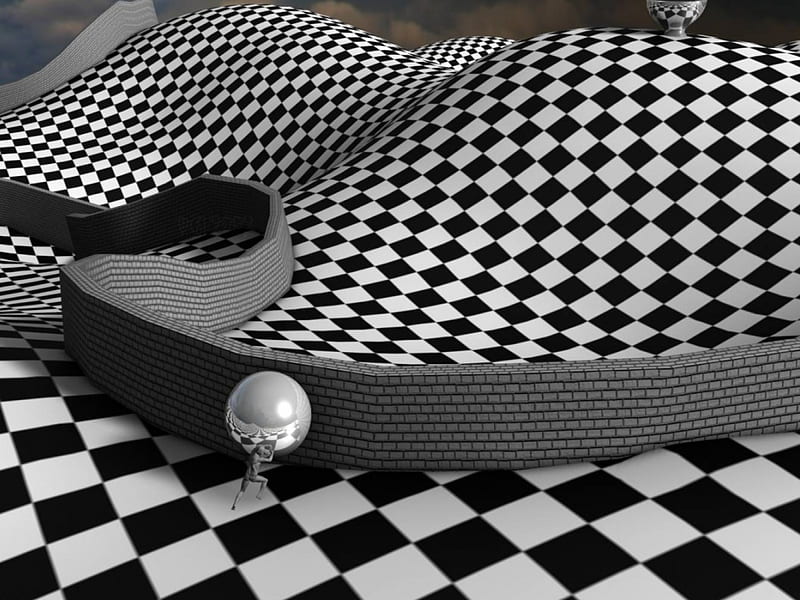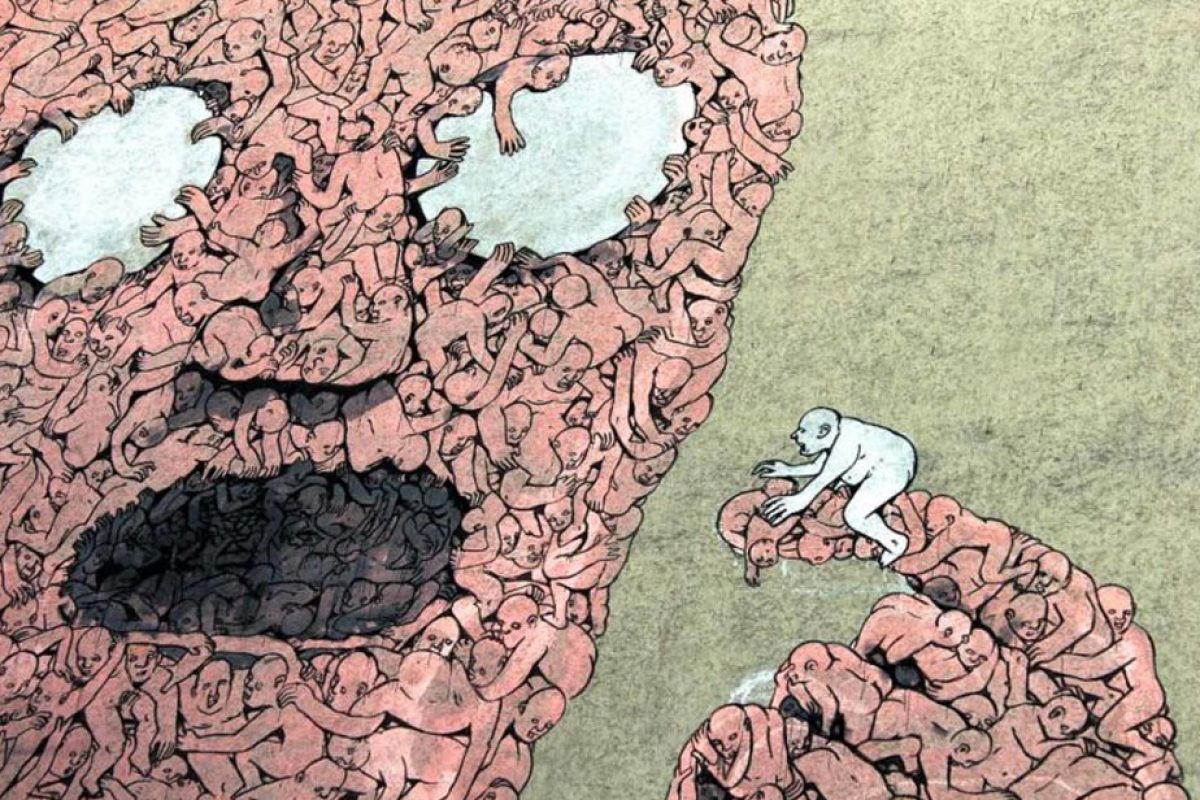Everyone’s always in such a hurry to create the Nullity. ‘Quick, quick, quick’, we say, ‘there’s no time to lose – we have to create the Nullity!’ This is the message society is constantly giving it us – we hear it right from the word ‘Go’, we hear it just as soon as we are able to hear anything. This is an essential part of the socialization process and the earlier we start the better…
Prizes are handed out for the winners. Prizes are always handed out for the winners. Winning is always so very exciting. We like to win – we like to win so much! And if we don’t win then we don’t need to be discouraged because we can always dream – ‘maybe one day we’ll pull it off,’ we say, ‘maybe one day we’ll be successful in creating the nullity…’
‘Wouldn’t it be great, wouldn’t it be great,” we say to ourselves. This activity of ours is called dreaming and we place we spend most of our lives doing it. We’re always doing it! This is our constant thought – ‘If only we could bring the Nullity down on our heads how fantastic that would be!’ we say. ‘If only’, we say, ‘if only…’
Every time we try to bring things to a conclusion (every time we try to wrap things up nicely and tie a bow on it) we’re attempting to call the Nullity down upon our heads. Essentially, when we try to solve the problem in some sort of conclusive (or ‘final’) way we’re trying to solve everything – we’re trying to ‘solve all our problems once and for all’ and in trying to do this we’re trying to end life itself. We’re trying to ‘close it all down’.
We don’t see that this is what we’re trying to do – we don’t see it like that at all. We would say that we’re trying to attain this that situation where there are no more problems, that situation where ‘everything is fine and dandy forever and ever’, and where therefore we can finally get to reap the reward for all our hard work. We want to sit around strumming our harps in heaven…
In one sense, all problems are the same problem (although we’d be inclined to deny this). Another way of putting this is to say that ‘our problem is that we don’t want to have any problems’. Because we’re against having problems in principle we believe that the state of ‘never having any more problems’ is the ultimate good thing – that’s our idea of heaven, that’s our idea of paradise, that’s what we’re always hoping for. We are rowing madly in our little rowboats trying to find a place where we don’t have to row anymore, says Gurdjieff. We work extra hard so that we can reach that place where we don’t have to work ever again…
This is in the nature of finite play, as James Carse tells us – finite play is played in order to ‘bring itself to an end’; it’s ‘play that is against itself’, in other words. This isn’t such an unfamiliar idea, of course – we’re working away at some job or other and we don’t find what we’re doing at all interesting, at all rewarding. We’re striving to complete some mechanical task and we have no interest in it but we stick with it all the same because we’re going to be given some sort of prize at the end of it all. We’re going to be rewarded. The reward isn’t in the work itself but is something separate, something entirely unconnected to the work. What we’re talking about here is what we generally refer to as ‘paid employment’, therefore.
We’re doing the work but this isn’t because we want to, it’s because we want the reward that’s being dangled in front of our noses. What we want is to ‘get to the end of the work’, what we want is to ‘finish with it once and for all’. We want to be rid of it, and so what’s happening here is that we’re going against ourselves in some fundamental way. We’re going against ourselves because we have been externally incentivized to do so. This is the idea of ‘finite play being played for the sake of bringing itself to an end’, therefore. Finite play – we might say – is play that is directed towards a specific (or ‘designated’) end. This makes it quintessentially repetitive – repetition being the key characteristic of mechanical activity. Mechanical activity is activity that is forever stuck in the same groove.
‘The mechanical’ is an insult to the soul. It’s a misery to us, but we endure it because of the reward we are being offered. We endure it because we are being extrinsically motivated to do so. In the mechanical realm we are compelled to ‘go against our own nature’ – ‘You will be required to do wrong no matter where you go’, says Philip K Dick in Do Androids Dream… ‘It is wearisome upon the same things to labour and by them be controlled,’ says Heraclitus. We might be continually focussed on achieving some specified end (which means eliminating everything that isn’t this specified end) and say – as Heraclitus does – that we’re being controlled by this end, or we could look at it the other way around and say that the ‘end’ which is being served is the self and that we are therefore ‘being controlled by our need to serve the self’. These two ways of looking at things are equivalent – when I try to achieve the specified goal I do so because it suits me to do so, because I’m going to benefit myself by doing it. I am serving myself with my finite play, therefore.
Finite games are inherently ‘self-serving’ – I am constantly orbiting the goal (or the ‘attractor state’) of winning (of ‘attaining the specified outcome’, whatever that might be) and I am also orbiting the self because it’s ‘the self’ that wants to win, because it’s ‘the self’ that feels good about winning. I’m not trying to win for anyone else’s sake, that’s for sure! When I try to obtain a specified outcome and this outcome is somehow final for me (i.e., it is ‘an end in itself and doesn’t lead anywhere else’) then this is a personal meaning that I myself have projected upon it. It won’t hold this meaning for anyone else (unless they first agree for it to, that is) and this is another way of saying that one point in a process is never going to be any more ‘special’ than any other point (since ‘special’ is our own private meaning that we have projected upon it). ‘Winning’ doesn’t exist in nature, we might say, but rather it is an ‘artificial imposition’, a function of thought.
When we project our own meaning on the world in this way then we get trapped in this meaning. When I believe that ‘attaining the goal’ says something special about me (i.e., that it says that ‘I am a winner’, which – by definition – is ‘the best thing ever’) then where can I go from this? All I can do then is ‘spin around on the hop of the obscene ego’, as DH Lawrence puts it (in his poem Death is not evil, evil is mechanical). I am ‘in orbit around myself’, in other words, and I’m never going to wander off this fixed track. ‘Fixed, yet in motion’, as Lawrence says. In this closed world (the closed world of my own private game, my own private projected meaning) ‘I define winning and winning defines me’ and this is a tautological loop of logic. It’s a ‘null situation’. As I approach the goal state I will repeatedly get the impression that I am approaching something real, something wonderful, but this good feeling will always escape from my clutch just as soon as I get my hands on it. It will run away from me and I will have to start chasing it all over again. This is why ‘the chase is better than the catch’. The good feeling will always run away from me because it’s a ‘projection rather than a real thing’, because it’s ‘a function of the empty, private game that I’m playing’ – the empty, private game which is the Nullity.
Image credit – wallpapeflare.com






